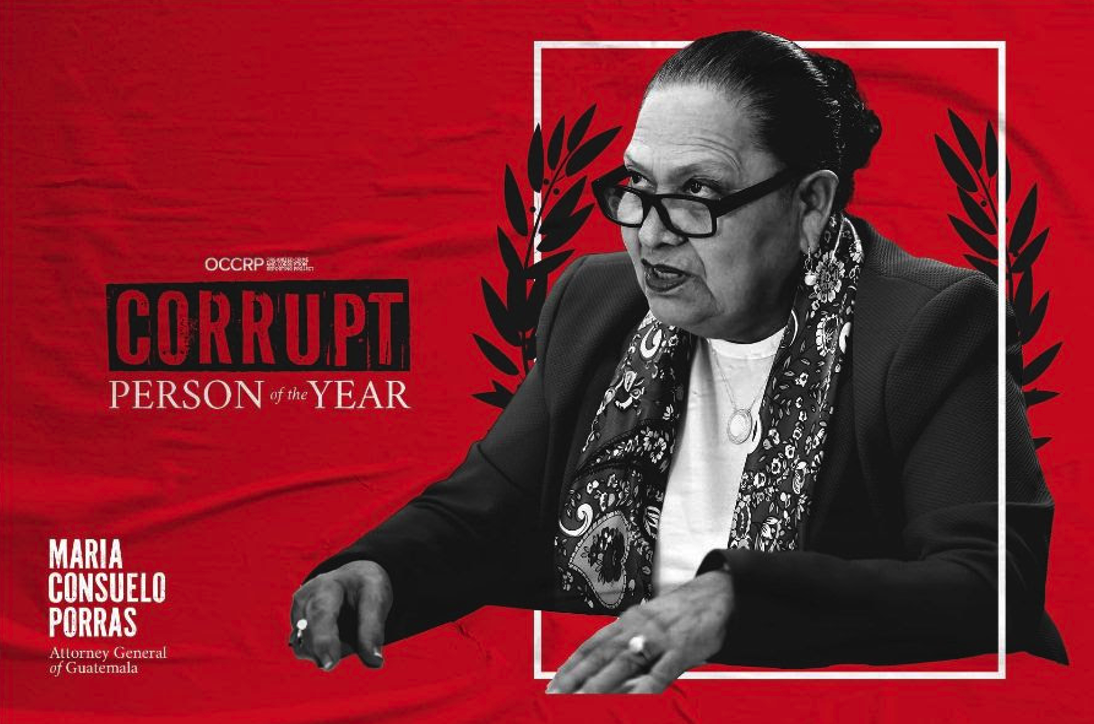
The Organised Crime and Corruption Reporting Project (OCCRP) annually bestows the award ‘Person of the Year in Organised Crime and Corruption’ on those who have done most to bolster corruption and the political collusion that accompanies it. OCCRP is one of the few outlets equipped to investigate these key enablers of corruption.
Since 2012, they have bestowed this annual award on those who’ve done the most to bolster corruption and the political collusion that accompanies it. In the past, this dubious honour has been given to colourful despots, but this year, their panel of judges voted for a dry bureaucrat who has eviscerated the rule of law in Guatemala.

Why Porras Won: Guatemala’s attorney general made international headlines earlier this year when she oversaw efforts to prevent president elect Bernardo Arévalo from assuming office, including suspending his political party and raiding the election commission.
People tend to think of failed states as being solely run by authoritarian strongmen. But today’s autocrats are often careful to not disavow democracy. Instead, they undermine its framework, including elections, the judiciary, and state institutions. Key to that strategy are people like Porras — bureaucrats who corrupt the democratic process while maintaining the illusion of normality.
Other Guatemalan corruption
(There is no shortage of it.) We are grateful to the OCCRP for their regular bulletins on crime and corruption around the world which give us a source of information normally hidden from public view in the Central American countries. Specific credit is given by the OCCRP as:
Credit: James O’Brien/OCCRP
by Jonny Wrate (OCCRP) and Bill Barreto (No Ficción)
15 December 2023
OCCRP website: https://www.occrp.org
Central American Development Bank’s Role in Guatemala’s Odebrecht Scandal
An investigation by prosecutors — including testimony from a former minister at the centre of several corruption scandals — indicates a loan from the Central American Bank for Economic Integration (CABEI) may have been a key part of the Brazilian construction company’s bribery scheme.
Key findings
- A former Guatemalan minister told anti-impunity prosecutors that he was aware bribes were offered to a CABEI director to get help securing favorable conditions for a loan to Odebrecht.
- The former minister has since claimed that he never made a statement to prosecutors and that his testimony had been fabricated to generate conflict, but Guatemala’s anti-impunity authorities — and three sources close to the Odebrecht case — confirmed that the former minister did in fact give the testimony.
- Reporters could not find documentary evidence that the bribe described by the minister was ever made. But an investigation by anti-impunity authorities in Guatemala found that money from CABEI’s loan to Odebrecht was allegedly used to pay bribes to the former minister and two other politicians.
- CABEI included a clause dictating that the Guatemalan government must hire Odebrecht when it first approved the loan, then later agreed to multiple changes that added millions of dollars to the contract.
- The minister also claimed that CABEI gave preferential treatment to a Guatemalan construction company in a related loan.
The Odebrecht corruption case has been a fixture of headlines for years in Guatemala, where the scandal-plagued Brazilian construction company was forced to repay over $17 million to the government after admitting that it bribed officials to gain a lucrative contract to renovate a major highway.
But another player in the case has largely escaped public scrutiny: the highway’s major financier, the Central American Bank for Economic Integration, or CABEI.
The bank provided the key loan to Odebrecht that allowed the project to move forward, agreeing in 2011 to lend almost $120 million to finance the longest section of Central American Highway 2, which would link El Salvador to Mexico.
Along the way, it overrode its own procurement rules to insert a clause in its loan agreement mandating that Odebrecht must receive the contract to build the highway, without the normal bidding process. Later, Odebrecht paid out millions in bribes directly from the money CABEI disbursed, according to an investigation by a UN-backed anti-corruption commission.
“Much of the corrupt diversion of funds from [CABEI’s] loans continues to be unaddressed due to the opaque and secretive policies that the bank applies to civil society groups and justice institutions that seek to know their final destination,” said Manfredo Marroquín, the president of Transparency International’s Guatemalan chapter, Acción Ciudada
The Guatemalan minister accused of personally receiving the largest chunk of the bribe money, Alejandro Jorge Sinibaldi Aparicio, turned himself in in 2020 after four years on the run. He then made an explosive statement to prosecutors that also accused a CABEI official of conspiring with Odebrecht to make sure the highway contract would be favorable to the company.
Credit: James O’Brien/OCCRP
by Jonny Wrate (OCCRP) and Bill Barreto (No Ficción)
15 December 2023